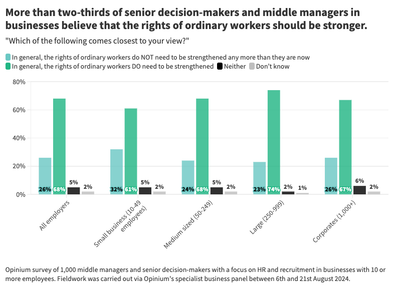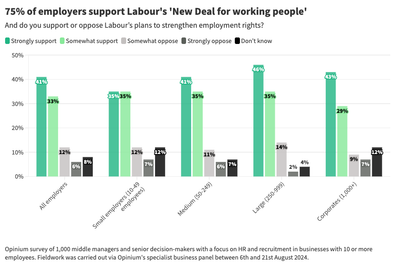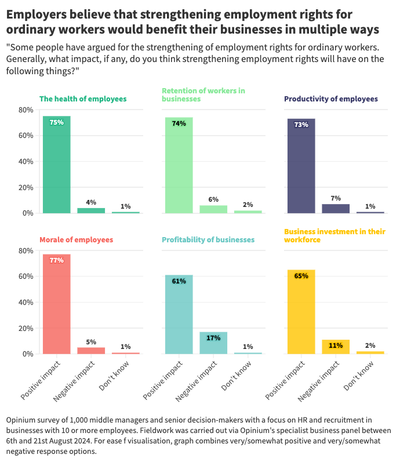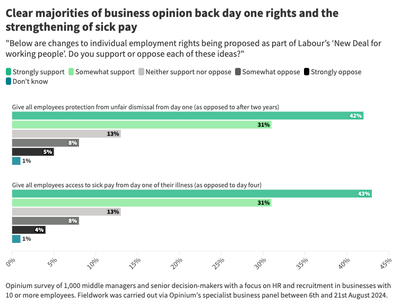
Strengthening the foundations: Why employers support stronger workers’ rights
Article
Labour won the election promising to strengthen workers’ rights and most employers think their policies will be good for the economy.
Keir Starmer’s government has committed to tabling an Employment Rights Bill within 100 days of entering office which will introduce significant changes to employment law. Labour plans to strengthen workers’ rights in a wide range of areas, including protecting employees from unfair dismissal, banning zero hours contracts and improving access to sick and parental pay. The changes will strengthen economic security for millions of workers.
A clear majority of employers support these changes. New polling from IPPR, the TUC and Persuasion UK has found that most employers support the idea of strengthening the rights of ordinary workers in principle and welcome specific policies announced by the government.
More than two-thirds (68 per cent) of senior decision-makers and middle managers in businesses, including six in 10 (61 per cent) in small businesses, believe that the rights of ordinary workers should be stronger.

Support for strengthened employment rights among employers increased once they were told about the full detail of the government’s proposals. A majority of businesses (69 per cent) are aware of Labour’s ‘new deal for working people’ and the polling found that an overwhelming majority (75 per cent) support the measures, including nearly seven in 10 (69 per cent) small businesses. Only 17 per cent of employers oppose the government’s policies.

The polling reveals strong support for the government’s plans amongst those making decisions within businesses and frequently engaging with workers. Employers believe that strengthening employment rights for ordinary workers would benefit their businesses in various ways:
- Profitability: Six in 10 (61 per cent) think stronger employment rights will have a positive impact on business profitability, compared to fewer than 2 in 10 (17 per cent) who disagree.
- Investment: Six in 10 (65 per cent) think stronger employment rights will have a positive impact on business investment in the workforce, compared to 1 in 10 (11 per cent) who do not.
- Productivity: Seven in 10 (73 per cent) think strengthened employment rights will boost productivity, compared to just 7 per cent who disagree.
- Retention: Seven in 10 (74 per cent) think that strengthening employment rights will improve workforce retention, compared to just 6 per cent who do not.
- Workforce health: Seven in 10 (74 per cent) think that strengthened employment rights will improve employee health, compared to just 4 per cent who disagree.

These results suggest that employers believe there will be economic benefits from making workers’ rights stronger. The UK economy has experienced significantly slower productivity growth than comparable countries since the financial crisis and has had the lowest levels of business investment in the G7 for three years in a row. A majority of employers believe that the government’s employment rights policies will have a positive effect on productivity and investment, as well as the profitability of their business.
In terms of specific policies, most employers (73 per cent) support giving employees protection from unfair dismissal from the first day of employment, known as ‘day one rights’, compared to a small minority (13 per cent) who opposed the measure. A majority of employers (74 per cent) also support giving employees access to sick pay from day one (compared to 12 per cent who oppose the idea).

IPPR, the TUC and Persuasion UK are polling employers’ views on the government’s specific policies on employment rights. The results will be published in advance of the arrival of the Employment Rights Bill in Parliament.